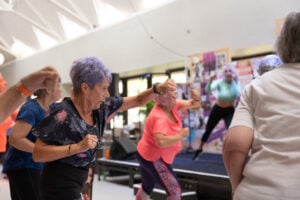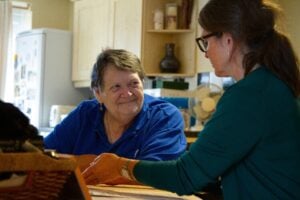Winter foot care tips
Tags
Living Well
Taking care of your feet in later life is really important. Foot problems can cause pain and discomfort, this can impact your balance which can increase the risk of falls. In cold temperatures you may need to take some extra precautions to keep your feet healthy. We’ve covered some winter foot care tips below, as well as details of where to find specialist support should you need it.
Stopping your feet drying out in winter
Our skin will often get drier with age, and the addition of colder winter air can make it even more essential to keep skin moisturised. Dry feet can crack and cause discomfort over time, and if left untreated may let in bacteria and lead to an infection.
The NHS recommends moisturising your feet daily with a moisturising cream such as E45 or a heel balm containing 25% urea to avoid dry skin. If you have thick, hard skin you may find it helpful to rub these patches gently with a pumice stone. When applying creams, avoid using too much and putting it between your toes. It’s also important to ensure it’s fully soaked in before standing up, especially if you have hard floors which you could slip on.
It’s not always easy to remember to moisturise your feet everyday – especially in cold conditions when they’re usually hidden under cosy socks or slippers. You may find it easier to keep moisturiser by your bed and incorporate it into your bedtime routine, or to set a reminder on our smartphone or alarm clock.
Keeping your feet warm yet breathable
When your body temperature drops, blood vessels constrict to keep blood flow closer to your internal organs and conserve heat, which is one of the reasons why our feet often feel colder than the rest of our bodies. In later life our hearts may also find it harder to push blood back up to the heart – this poor circulation can lead to colder legs and feet too.
Make sure to always wear appropriate socks and footwear, even around the house if your feet are chilly. If your feet get cold at night, go to bed wearing socks. You may also find heated socks useful on particularly cold days. These are often powered by battery packs, so it’s recommended to only use them during the day time.
Wool socks are a good choice as the natural material keeps heat in while wicking away moisture. Cotton socks, while not as warm are also a good breathable choice suitable for sensitive skin.
If you’re wearing thick socks and closed-toed shoes, it’s equally important to let your feet breathe for an hour or two once you’re back at home in the warm. Keeping feet all wrapped up 24/7 can cause them to sweat which may increase your risk of fungal infections.
Choosing the right footwear
In winter when you’re facing cold weather and icy conditions, choose thick, cushioned soled shoes with grippy treads. Breathable material like leather can be a good option too. The NHS also recommends –
- A roomy toe-box at the front of the shoe to prevent pressure on your toes and the sides of your feet.
- A heel no more than 3cm (1.5 inches) high
- Winter boots or shoes with laces, buckles or Velcro fastenings that hold the shoe comfortably and strongly to your feet. Avoid slip on shoes
- Avoid wearing slippers outside as footwear or all day
Physiotherapist Nancy Farmer has shared further tips on finding the right pair of shoes in later life here.
Keeping your feet clean and dry
In colder months it’s still important to wash your feet everyday with warm water and soap or cleanser, even if you don’t think they’ve been sweating. You may find it easier to do this in a bowl rather than in the bath or shower. Using a soft nail brush can be beneficial, and the NHS suggests not soaking your feet for longer than 10 minutes as this could dry out our skin. Be sure to dry your feet thoroughly before putting your socks back on.
Checking your feet regularly for problems
When you’re washing your feet it’s a good opportunity to check for any signs of infection or damage.
Check the top of your foot, sole, heel and between your toes for changes in colour or redness, sores, swelling or bruising. If you’re finding it difficult to see, try using a mirror for hard to reach areas or asking a friend or family member to help you.
If you see something that doesn’t look right, it’s always best to seek the expertise of a doctor, podiatrist or chiropodist.
Finding podiatrists and chiropodists services
Podiatrists and chiropodists are the same thing, but podiatrist is the more common name used these days. These healthcare professionals are specially trained in diagnosing and treating a wide variety of medical conditions that affect the feet and lower limbs. This includes things like –
- treating foot pain and supporting comfortable mobility
- offering specialist care to people with diabetes, who are at greater risk of foot problems
- providing orthotics, such as arch supports and padded shoe inserts
- treating complaints like corns, calluses, bunions, and foot ulcers
- treating fungal nails and athlete’s foot
- assisting with nail cutting and filing toenails
- performing surgery on ingrown toenails
You can find your nearest NHS podiatry service using the search tool on the NHS website here.
Can a carer from the Elder platform help with foot issues?
While a lot of nail and foot care is best left to professional podiatrists, a self-employed carer on the Elder platform can play a crucial role in general day to day foot care and hygiene – especially over the winter months. This may include keeping feet clean, warm and comfortable.
For more information on how a self-employed carer can help, take a look at our guide.
Sources:
- https://podiatrystation.com/essential-foot-care-tips-for-the-winter/
- https://www.nhsgrampian.org/globalassets/foidocument/foi-public-documents1—all-documents/footcare-advice-pil.pdf
- https://www.nhsinform.scot/healthy-living/preventing-falls/keeping-well/looking-after-your-feet/
- https://www.torbayandsouthdevon.nhs.uk/uploads/22233.pdf
- https://www.ageuk.org.uk/information-advice/health-wellbeing/keep-well-this-winter/stay-healthy-in-winter/how-to-keep-your-hands-and-feet-warm/
- https://www.bdct.nhs.uk/what-do-podiatrists-do/
Read more later life articles

How to select the right mobile phone for an elderly family member
Mobile phones are a great way to stay in touch and can provide essential peace of mind to you and your loved ones. However, as

Finding suitable respite care – your complete guide
Respite is a term for services that offer short-term care to vulnerable people, and enables family carers to take a break from their caring responsibilities.

Christmas gift ideas for elderly parents who have everything 2024
Looking for the perfect gift for an older person in your life? From gifts that can help make their daily lives easier, to those with

Paying for care in Scotland
Paying for care is a complex subject. Different parts of the UK charge different fees, have their own rules on funding, and even offer some

Active Leeds – how older people can stay active and meet new friends
Regular physical activity isn’t just about keeping fit—it’s about maintaining our independence, enhancing our mental health, and improving our overall quality of life. While our

Meals on wheels in Leeds – getting quality meals delivered locally
Even if you love to cook, preparing meals can become more challenging in later life. Lifting heavy pans, using knives and exposure to extremely hot
